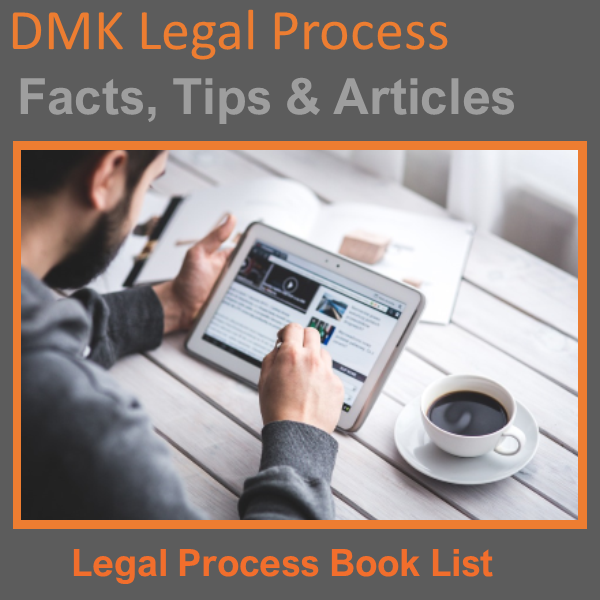Divorce is a challenging experience for a variety of reasons. Emotions, legal fears, and money are usually at the top of the list and big reasons for a reduced attention span. While an attorney may be extremely helpful, it isn't uncommon for him/her to throw a lot of legal mumbo jumbo your way at a time you are least likely to retain and/or understand it. DMK to the rescue!
We put together a list of terms that every divorcee should know before stepping foot inside their attorney's office.
Important Legal Terms Specific to Divorce
Petition (Petition for Dissolution of Marriage): Legal document used when a spouse requests a dissolution of marriage. Specifically, it is a formal application to a court for a judicial action (order of the court).
Petitioner: The party initiating the divorce and making the formal written request to a court for a Dissolution of Marriage.
Respondent: The party responding to the legal action that has been filed (Petition for Dissolution of Marriage).
Counter Petition: Similar to the Petition, only it is the Respondent's opportunity to ask the court for something. It most often accompanies the Answer, denying parts of the original Petition for Dissolution of Marriage that which the Respondent might not agree, thus requesting the Petitioner prove.
Maintenance: Also known as Spousal Support, Support or Alimony, it's a court ordered amount of money (either agreed upon by both spouses, judge or arbitrator) one spouse, who typically earns more or has a financial advantage (such as separate assets), pays the other spouse over a period of time. It typically ends when the receiving spouse remarries. Lump sum settlements are an alternative to maintenance payments. Maintenance is not the same as child support.
Child Support: A court ordered amount of money (either agreed upon by both spouses, judge and/or arbitrator) one spouse, who most typically earns more, pays the other spouse a specified monthly amount to care for the children named in the divorce. It typically ends when the children turn 18, goes to college, gets married or dies. However, there are numerous variables that affect child support in each state. So, it's important to get to understand your state's guidelines and laws regarding child support.
Motion: Formal request made to a judge for a new or modified order or judgement. They include reasons why the request should be granted.
Hearing: A legal preceding held before a judge in which evidence and arguments are presented. It is often preceding or in place of a full-scale trial for the resolution of specific terms of the case.
Trial: A legal preceding presided over by a judge whereas evidence is presented by witnesses for the examination of law and facts related to a divorce in order to reach a binding decision.
Relief: A collective term used to describe multiple types of avail given a party to a lawsuit through a court order or judgement. It is everything sought by a spouse in a divorce complaint. An example would be a request for the court to equitably distribute your marital property and debts.
Prayer: What one spouse wants from the other. It is a request for a judgement, relief and/or damages at the end of a petition.
Answer: A formal, written pleading in which a party (the spouse being divorced) to a lawsuit responds to a Petition for Dissolution of Marriage requested by a Petitioner (the spouse initiating the divorce).
Stipulation: An agreement between a single party or both parties that a fact is uncontested. It may include agreements by the parties of certain acts or actions. It eliminates the need for such terms of the divorce to be decided by a judge.
Settlement: An agreement outlining the specific terms of a divorce a couple reaches outside of court.
Judgement: An order of the court with the judge's ruling outlining the terms of a divorce. It is not necessarily a final judgement.
Final Judgement of Divorce, Final Order of Divorce or Decree of Dissolution: The written court order formally ending a marriage. It includes terms of the judge's ruling and/or incorporates the couple's settlement agreement. The terms typically include maintenance, child custody/support, division of marital estate.
Appeal: A request by one party to a higher court to reverse the decision regarding some or all terms of the divorce based on legal error or wrongdoing.
Disclaimer
The information provided by respective owner's ("we", "us" or "our) on Divorce Me Knot (referenced also as "DivorceMeKnot.com", "dmk", "DMK", "OurDMK.com", "OurDMK", "application" or "site") is for general informational purposes only and is subject to change with or without notice. All information on our site and application is provided in good faith, however we make no representation, guarantee or warranty of any kind, express or implied, regarding the accuracy, validity, adequacy, reliability, availability or completeness of any information on the site or application.
The information in articles and all content on this site should not be considered psychological or behavioral health therapy, counseling or legal, financial, real estate, mortgage, insurance or professional advice. It should not be used in place of professional advice from a licensed professional or credentialed expert. Providers of content on this site, herein known as "Contributors" (inclusive of, but not limited to writers, bloggers, editors, employees, developers, graphic designers, advertisers, partners, affiliates, references, experts, professionals and site owners) are not legally liable for any misinformation, errors or omissions. Names, details and images may have been changed in the content of this site.
Under no circumstances should DMK and/or it's Contributors have any liability to users of the site for any loss or damage incurred to users as a result of the use of this site or application or reliance of any information provided on the site or application. Use of the site or application and reliance on any information from the site or application is solely at the user's own risk.
For complete site disclaimers review "Disclaimers" on this site or click the link below.
Read Complete Site Disclaimers Here





 How to resolve AdBlock issue?
How to resolve AdBlock issue?